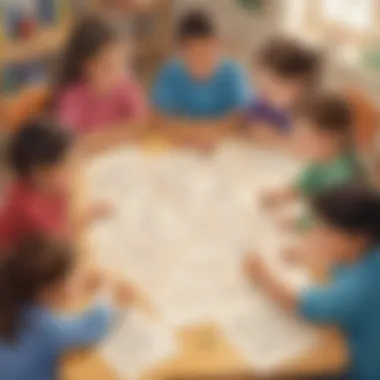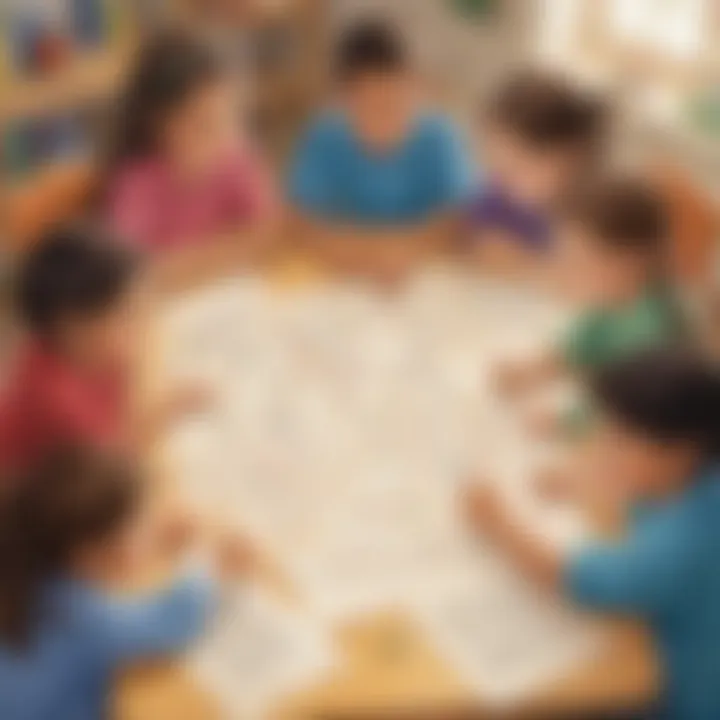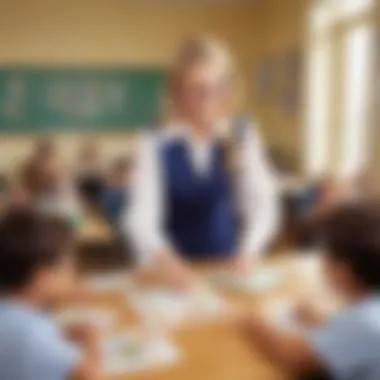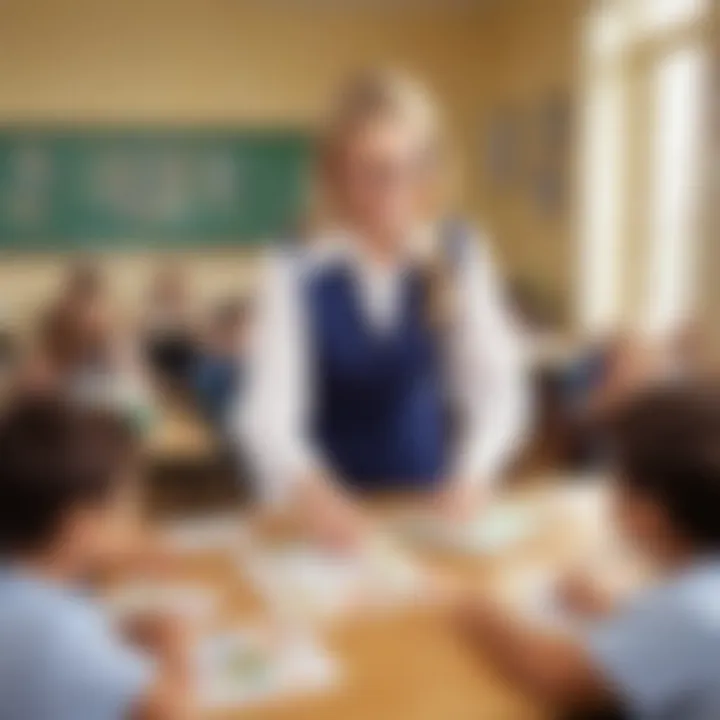Discover Engaging Free Spelling Games for 2nd Graders


Intro
This is a crucial stage in child development. Second graders are building their spelling skills. Early education is pivotal for this progress. This article explores free spelling games tailored to these young learners. Spelling has a profound impact on cognition and literacy development. In addition, it fosters social abilities as children engage with peers.
You will discover various resources. From online games to offline activities, the variety is ample. Each method enhances not only spelling but also critical thinking. Engaging in these games can be fun and beneficial. The goal is to enhance comprehension and retention through playful learning.
These options are easy to access. They add value to learning plans both at home and in the classroom. There are many ways to integrate implementation for starting these games. Below, you'll find focused discussions on creative activities, quizzes, and additional resources. Let’s delve into these engaging methods and games.
Creative Activities
Educational play is important. It can take form in various hands-on craft ideas. These allow for learning while keeping interest high. Parents and teachers can create art projects with spelling themes. Simple things like creating letters with play dough or making word collages from magazines.
Craft Ideas
Here are a few suggestions:
- Letter Building: Use clay or blocks for children to form letters.
- Alphabet Art: Make a wall poster for every letter, adding words related.
- Spelling Boxes: Craft shoeboxes labeled with letters, filling them with pictures of objects that match that letter.
These activities support learning through visual and tactile methods, which is vital. They support motor skill development too.
Step-by-Step Guides
Each activity should involve clear instructions. For example, making the Alphabet Art involves:
- Write down each letter on separate sheets.
- Explain to the children to draw objects or write down words corresponding to each letter.
- At the end, frame it or stick it as a poster on the wall.
This engages their minds and gives a sense of achievement when done. It also encourages discussion.
Educational Value
These creative tasks enhance learning. They mix fun with educational aims. Children experience enhanced memory through crafting actions. Visualization helps solidify knowledge. Additionally, children learn to work with others, fostering cooperation.
Fun Quizzes
Quizzes can be an entertaining way to learn. A platform like ElemFun offers engaging quizzes. This helps reinforce spelling. They have a connected variety of topics for children to explore. Reinforcing previous lessons is essential in the learning process.
Quiz Topics
Children can test the following areas:
- Sight Words: Recognizing common words effortlessly can aid reading.
- Spelling Patterns: Understanding sound-letter relationships lead to better skills.
- Context Usage: These towards applying correct word forms within sentences.
These topics develop phonetics and comprehension.
Question Types
ElemFun uses various question styles:
- Multiple choice.
- Fill in the blanks.
- Matching words with pictures.
These formats can incite interest. They motivate children to think differently.
Knowledge Reinforcement
Quizzes function as a critical understanding tool. They identify areas needing more practise. After completing quizzes, children reflect on what has been learned. Motivation can stem from completed quizzes, producing a sense of fulfillment.
Fact-Based Articles
Articles solhads additional learning prospects on topics related to spelling. They entrap the interest of kids with diverse subjects. Through engaging facts, learning is not just rote memorization.
Topics
These fact-based articles cover many areas:
- History of the English language.
- Importance of spelling in formal education.
- Fun facts about words and their meanings.
Engaging Content
Content is designed to maintain young reader's attention. Short paragraphs and visuals align simplicity with fun. This makes for a smoother reading experience. They contain paradigms and quick quizzes embedded too, which allows further questing.


Prelims to Spelling Games
Spelling is a foundational skill for young learners. Good spelling can shape a child's reading and writing capability. As second graders start building on their basic literacy skills, incorporating spelling games is not only beneficial but essential. These games create an environment that nurtures spelling proficiency while making learning fun and engaging. Thus, its relevance in this article is substantial.
Understanding the Need for Spelling
Children in second grade typically learn to read fluently. Spelling plays a significant role in this process. The correlation between spelling and reading fluency is well-documented. When students can spell words correctly, they tend to recognize these words more readily when they read. Conversely, poor spelling may impede reading instruction and comprehension.
It is crucial for educators and parents to recognize that spelling errors impact a child's expression. For instance, writing ability improves with spelling accuracy. Once a child knows the mechanics of spelling, their confidence in skills such as writing expands. Additionally, spelling instruction can enhance vocabulary. Seeing words in numerous applications enables better retention.
When children learn spelling through enjoyable means, it transforms routine practice into a more rewarding endeavor. As they explore different words and their meanings, they strengthen their decoding abilities essential for future literacy success.
How Games Facilitate Learning
Incorporating games into education is a time-tested method to capture attention, especially among young learners. Games serve as a motivational tool. They can stimulate competitive spirit and offer rewards, making children more inclined to participate in learning activities.
Reasons why games can be effective include:
- Interactive Elements: Games often turn ordinary drills into dynamic experiences, where kids can engage with both peers and the material effectively.
- Variety of Formats: Games come in many forms, from written activities to digital applications. This variety caters to different learning preferences, keeping lessons fresh.
- Reduced Anxiety: Learning through play can reduce the pressure some children feel in a traditional classroom. When they associate education with fun, they engage more willingly.
- Reinforcement: Games allow for repeated exposure to words through various contexts. This repetition aids in reinforcement without becoming monotonous.
Studies have suggested that gamified learning can boost retention rates, enlightening both educators and parents about the cognitive benefits of these activities.
Encouraging second graders to practice spelling via games impacts their educational journey positively. as they not only develop spelling skills but also enjoy the process itself.
Types of Spelling Games
Spelling games play a critical role in helping second graders develop their language skills. Engaging in various types of games can make learning entertaining while also reinforcing essential concepts. Games not only motivate students but also provide them with opportunities to practice their spelling in different contexts. Understanding the various kinds of spelling games available can help educators and parents select the best methods to improve spelling skills in young learners.
Phonics-Based Games
Phonics-based games focus on teaching children the connections between letters and sounds. These activities help students learn to sound out words and understand the basic principles of spelling. Phonics games might include matching sounds to letters, filling in missing letters, or blending sounds to create words. They are particularly helpful for second graders as they build a solid foundation for reading and writing by reinforcing sound-letter relationships.
Online resources like Starfall and ABCmouse offer interactive phonics games where students can get immediate feedback on their progress. Engaging with phonics-based games can carve a path for lifelong literacy skills.
Word Scrambles and Jumbles
Word scrambles and jumbles serve as fun activities where letters of a word are mixed up. The player's task is to reorganize the letters to form correct words. These games promote critical thinking and help enhance word recognition skills. Some platforms also allow for thematic scrambles, linking them with specific vocabulary lists or curricular subjects.
Using services like WordJumble or printed worksheets, educators can create custom scrambles based on current lessons. Not only does this lead to improved spelling skills but it also enhances cognitive skills as students learn how to decode and organize letters.
Flashcard Games
Flashcard games provide a straightforward yet effective strategy to reinforce spelling words. Flashcards with words on one side and definitions or pictures on the other can help young learners build strong associations with each word. Using these in a game format, such as timed challenges, can add a level of excitement to studying. Children can work individually, in pairs, or in groups to excel in these challenges.
Flashcard resources can be accessed through platforms like Quizlet. These tools can encourage children to memorize words while having fun—that is the key balance of flashcard games!
Interactive Online Games
Interactive online games have fundamentally transformed how children engage with learning materials. These games typically include multistep clues, visual aids, and different level challenges which makes learning engaging. Sites such as CoolMathGames or PBS Kids provide free spelling games geared toward second graders, covering diverse aspects of spelling and vocabulary.
Interactive gaming not only offers immediate feedback and varied difficulties but also leverages the social aspect of learning. This allows kids to enjoy competition and teamwork among peers while enhancing their spelling skills, paving the way for both academic and social benefits.
In summary, utilizing a range of spelling games is essential in helping second graders develop their writing and language abilities. Each type of game has distinct will impart unique skillsets which complement traditional methods of teaching spelling.
Benefits of Spelling Games
Spelling games offer far more than simple word formation. They serve as potent tools in the early education of children, particularly in the second grade, where foundational skills are built. The advantages of these games encompass several aspects, ranging from enhancing vocabulary to fostering cognitive development and promoting collaborative skills among children.
Enhancing Vocabulary Skills
One of the most significant benefits of spelling games is the enhancement of vocabulary skills. When children engage in activities that revolve around word formation, they are exposed to a wider array of terms. The repetitive use of words helps imprint their meanings and spellings in young minds.
- Using interactive games introduces common second-grade spelling words in fun contexts.
- They also provide contextual learning of words, making them memorable.
For example, games that encourage children to both view and hear words actively strengthen not only spelling but also pronunciation and comprehension. Children learn through play, and through spelling games, vocabulary expands in an organic and enjoyable way.
Improving Cognitive Development
Cognitive development in children is crucial for their overall learning processes. Spelling games stimulate critical thinking and problem-solving skills. As children attempt to spell words correctly under different constraints, they activate their memory and reasoning skills.
- Pattern recognition is another cognitive aspect greatly promoted by these games.
- Making connections between similar-sounding words or identifying prefixes and suffixes helps children decode and spell complex words.


These cognitive tasks enhance mental agility and encourage analytical thinking, laying the groundwork for future learning in language arts and other subjects.
Encouraging Collaboration and Social Skills
Lastly, spelling games can foster teamwork and collaboration among peers. In classroom settings or family environments, these games can be played in teams, providing an authentic experience of working together to achieve a common goal.
"Games encourage discussion, enhance communication, and help children learn from each other, making it more than just a learning opportunity."
- Game interactions not only strengthen social bonds but also build essential communication skills.
- Shared responsibilities in a game setting allow children to understand that teamwork can lead to success.
By improving collaborative skills, spelling games transform learning into a shared experience, enriching relationships among learners.
Top Platforms for Free Spelling Games
In discussing spelling games for second graders, one vital aspect is the platforms where these games are available. Accessing high-quality spelling resources is crucial for all learners. Parents and teachers can find their methods and adapt them according to their environment. Here, we will look closely at two categories of platforms.
Popular Online Resources
When children learn spelling through online platforms, they gain access to a range of possibilities. These resources are engaging and often designed to keep students interested and invested in their learning journey. There are several popular online resources available that offer free spelling games:
- Spell City: This website allows children to learn through interactive games based on spelling, vocabulary, and phonics.
- ABCya: This educational gaming site provides fun spelling games suitable for younger students, helping them improve through play.
- PBS Kids: The PBS Kids website has various spelling games that incorporate characters children recognize and love.
These online resources can personalize the educational experience. Features such as visual and auditory feedback make it easier for kids with various learning styles to interact. Additionally, the balance between playing and learning can lead to better retention.
Mobile Applications for Spelling
Mobility plays a key role in education today. Mobile applications for spelling can adapt to the varied lifestyles of families. Through these apps, educators and parents can ensure that children are learning spelling while having fun. Some beneficial mobile applications include:
- Endless Alphabet: This app incorporates animations and activities to make learning fun.
- Word Wizard: It provides tools to move through phonics and spelling seamlessly.
- Spelling Bee: It can recreate competitive practices in a playful way, encouraging spelling contributions.
Ease of access is compelling in using mobile app solutions for spelling games. Parents can encourage ongoing educational practice during car rides or while waiting. Furthermore, mobile applications allow children to progress at their pace, adjust to their learning curve, and revisit challenging words as needed.
Keeping an open channel between children and educational tools affords them confidence. Engaging with spelling games can bridge challenges and enhance cognitive growth while fostering enthusiasm for learning.
As technology evolves, so do the options available for enhancing spelling skills. Identifying important platforms and resources ensures effective engagement with second graders in their learning environments.
Integrating Spelling Games in the Classroom
Integrating spelling games in the classroom is a critical aspect of fostering effective learning. These games not only encourage engagement but also make the spelling process enjoyable for second graders. When teachers use games as part of structured instruction, they can enhance understanding and retention of spelling rules and vocabulary. The incorporation of playful elements in education addresses several important components of child development, including cognitive and social skills.
Spelling games serve as active learning tools that can lead to better mastery of vocabulary. This engagement could impede stereotypical, rote learning methods, giving way to improved critical thinking. In a game-oriented environment, students can better connect letters in their minds. They can also transition their newfound skills into practical, real-world application. The social interaction created in-class compitions resurfces collaboration opportunities among students, which can be beneficial both academically and socially.
Creating a Structured Game Environment
Establishing a restructured game environments within the classroom is important. A clear structure can channel children's energy toward meaningful learning. By allocating specific time frames for games, teachers can ensure that students are limited yet still focused. Teachers might set rules and expectations ahead of time; it is important to keep game sessions efficient so impact remains clear and evident. Such strategies foster competition healthily while reminding students of game etiquette.
Moreover, allowing students to have input in the types of games chosen brings a sense of ownership. This involvement can significantly increase motivation levels, directly influencing how students connect with the material. For instance, a teacher may use games like spelling bees or interactive digital platforms which will thrust students to participate actively in their own learning journey. An organized framework accompanies that with periodic check-ins to ensure fair play along with recognition of achievements.
Assessing Learning Through Games
Evaluating the outcomes of the games can provide pertinent insights into student learning. Games make identifying the strengths and weaknesses of learners more manageable. Formative assessments conducted during games proposition real-time feedback. Teachers can note which words or spelling rules resonate with students and which do not.
Using observation checklists can further detail where specific students may struggle. For example, a student finding double consonants challenging can have differentiated instruction prepared individually following the game's analysis. Games also introduce opportunities for informal assessment during or after play.
Family Involvement in Learning
Family involvement plays a crucial role in the education of children, particularly at an early age. When parents and caregivers engage in their children’s learning, it fosters a supportive environment where educational activities, such as spelling games, can thrive. This partnership not only reinforces the skills being taught in school but also helps to develop a love for learning.
Involving the family in educational activities can create a sense of community and support within the home. When children see their family taking an active interest in their learning, they are generally more invested in their own education. Moreover, it highlights the value of literacy and spelling, which are foundational skills for academic success.
Encouraging Family Game Time
One effective approach to enhance family involvement in learning is through family game time. When families set aside regular time to engage in spelling games, it creates an atmosphere of fun and encouragement. Parents can select games that correspond to the spelling curriculum or particular challenges faced by their children.
Benefits of family game time include:
- Strengthening relationships: Engaging in these activities provides opportunities to bond and share experiences.
- Boosting confidence: Family members can applaud and encourage one another, which can be particularly motivating for a second grader.
- Reinforcing learning through play: Children can absorb information and improve their skills without the explicit structure of traditional learning.
Creating an engaging game night does not have to be complicated. Simply rotating games or creating tournaments can keep the sessions fresh and stimulating, thereby maximizing the potential for learning.


Leveraging Games for Home Learning
Different from structured classroom settings, home learning with spelling games allows for flexibility, choosing what works best for each child’s learning style. By providing access to games and resources at home, parents can supplement educational experiences differently—from interactive online assignments to physical board games.
To effectively leverage games for home learning, consider the following tactics:
- Utilizing favorite family games: Many traditional games can be adapted to include spelling activities, such as incorporating spelling words into existing tabletop games.
- Setting individual or team challenges: Healthy competition within the household can motivate all participants while learning together.
- Reward systems: Offering rewards for achieving spelling goals can boost enthusiasm and create tangible incentives for learning.
Encouraging spelling practice at home, committed to enjoyable family interactions, aids children in naturally enhancing their skills. Family dynamics take part in a unique educational role, solidifying the bases for a child's learning journey.
“Family involvement is not a choice, but a necessity for effective learning.”
Challenges to Consider
When exploring free spelling games for second graders, it is crucial to be aware of several challenges. Balancing the fun and educational aspects, as well as addressing the individual needs of young learners, plays a vital role in successful learning outcomes. Understanding these challenges will help educators and parents create a more effective and supportive environment for skill development.
Balancing Screen Time
One significant challenge is balancing screen time. Children today engage with technology more than ever, which can both enhance and hinder their learning experiences. Educators and parents must find a suitable balance between using technology and encouraging other forms of learning. Excessive screen time can lead to health issues, notably in areas of physical activity and social interaction.
To manage screen time more effectively, consider the following suggestions:
- Set Firm Limits: Establish a daily screen time limit that adheres to pediatric guidelines.
- Incorporate Breaks: Encourage regular breaks during spelling games, allowing for physical activity.
- Quality Content: Choose educational games that prioritize learning and comprehension over free play.
- Make It Interactive: Opt for interactive games that require participation rather than passive viewing.
By being more intentional with technology use, you can enhance spelling learning without detracting from students' overall well-being.
Catering to Different Learning Styles
Another challenge in exploring free spelling games for second graders is catering to different learning styles. Each child absorbs information differently – some are visual learners, while others may thrive through auditory or kinesthetic experiences. Ignoring these diverse styles may lead to disengagement or a lack of understanding.
To address this complexity, consider employing a mix of game types, such as:
- Visual Games: Use games that include colorful graphics and spelling patterns for visual learners.
- Auditory Elements: Incorporate games that involve audio instructions or spelling words aloud.
- Hands-On Activities: Integrate kinesthetic learning with activities like letter blocks or sand tracing.
Think about each child's strengths to develop a wide range of spelling games that cater to various preferences. This approach promotes inclusivity and enhances overall learning experiences.
Offering a balanced and varied learning environment can empower all second graders to develop their spelling skills effectively.
Future Trends in Educational Gaming
The landscape of educational gaming is evolving rapidly, particularly for platforms that create spelling games tailored for young learners. The incorporation of innovative technologies is transforming how second graders interact with spelling exercises and accelerate their learning. Understanding these trends helps parents, educators, and developers to foster greater engagement and improve educational outcomes for children. This section explores relevant aspects of these trends and why they matter.
The Role of AI in Spelling Games
Artificial Intelligence (AI) is becoming vital in the realm of educational technology. It enables personalized learning experiences that cater to the individual needs of each student. AI can analyze a child's performance in spelling games and adapt accordingly. This can mean modifying the difficulty of tasks or suggesting targeted resources to enhance understanding.
Benefits of AI in Spelling Games:
- Adaptive Challenges: As a child improves their spelling skills, AI can increase the complexity of the words and tasks.
- Instant Feedback: Recognizing and correcting mistakes in real-time helps reinforce proper spelling.
- Engagement: Tailored experiences keep children interested and motivated to learn.
By making learning more personal, AI does not just facilitate spellings but also builds confidence in learners.
Increasing Personalization in Learning Apps
Another critical trend is the move towards increased personalization in educational apps. Modern mobile applications allow for customizable learning paths. Users could select specific areas of focus or areas where they struggle, making the learning experience more targeted.
Advantages of Personalized Learning in Apps:
- User Profiles: Parents can make profiles that track progress over time and focus on areas where their child needs additional practice.
- Choice of Tools: Children can choose their spellings from various categories, such as animals, food, or everyday objects, making it more relevant.
- Setting Goals: Parents and educators can set precise goals in the app, helping guide children towards specific learning milestones.
Personalized spelling games provide a rich educational experience. This diversification helps meet each child's unique learning needs and promotes a more profound mastery over spelling.
The fusion of AI and personalization in educational gaming is creating an extraordinary learning environment for young children, paving the way for future improvements in literacy skills.
The End
In summation, the topic of spelling games is crucial in the educational journey of second graders. These games cultivate not only spelling abilities but also enhance cognitive skills and foster social interaction among peers. The engagement induced by playful learning cannot be underestimated, as it forms a critical link between knowledge acquisition and enjoyment. Integrating these games creates a structured environment conducive to active learning.
The Lasting Impact of Fun Learning
Fun learning through games serves a profound impact on education, especially for young learners. When children engage with spelling in a playful context, they internalize words and concepts more effectively. The joy brought by having fun translates into higher retention rates of information. This demonstrates a significant contrast compared to traditional learning methods, where the lack of engagement often leads to a disconnect.
Also, games encourage children to collaborate and communicate, thereby building social skills. As they play together, they not only learn how to spell but form friendships and learn to work as a team. Almost any game can progress beyond the singular goal of understanding spelling, merging multiple skills together.
Overall, spelling games are a bridge that can provide students with the necessary linguistics keys while ensuring that education remains an enjoyable aspect of their childhood. As such, investing time in finding suitable free spelling games for second graders shapes a positive, lasting impression of learning in their formative years.
The right kind of play, centered around learning, flips the typical educational narrative from one of obligation to one of exploration.







